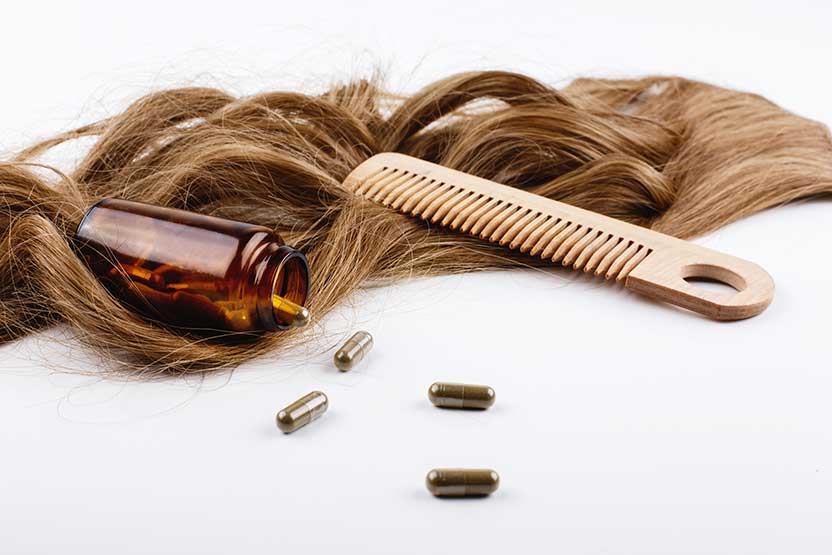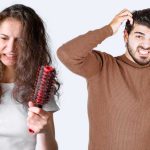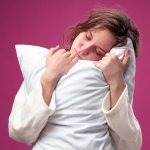Lack of Which Vitamins Cause Hair Loss?

Lack of Vitamin is the biggest cause of hair loss. In fact, many vitamin deficiencies are linked to hair loss. So to prevent hair loss due to vitamin deficiency, we need to know Lack of which vitamins cause hair loss. And how to address these deficiencies naturally.
According to the American National Library of Medicine, only Riboflavin (vitamin B2), Vitamin B12, Biotin, and Folate deficiencies are associated with hair loss. However, other vitamin deficiencies can also trigger hair loss.
The Independent Pharmacy in the UK identifies 10 vitamin deficiencies often implicated in hair loss. These vitamins are essential for the health of your hair:
- Vitamin D
- Vitamin A
- Vitamin E
- Vitamin C
- Folic Acid
- Biotin
- Zinc
- Vitamin B6
- Iron
- Essential Fatty Acids
Based on data from both organizations, this article discusses 12 vitamin elements whose deficiency is associated with hair loss.
Vitamin Deficiencies That Cause Hair Loss
1. Riboflavin (Vitamin B2)
Vitamin B2, or Riboflavin ensures the supply of essential nutrients and energy to hair follicles. Its deficiency causes disturbances in metabolism, as well as cracking, itching, and dermatitis of the skin, including the scalp, leading to hair loss.
The primary treatment for vitamin B2 deficiency is to consume riboflavin-rich foods, such as lean meats, liver, milk, eggs, green vegetables, and whole grains.
2. Vitamin B12
Vitamin B12 helps our body convert food into energy and plays an important role in nerve function. This micronutrient is required for DNA synthesis and red blood cell production, both of which are important for the growth of new hair fibers. Therefore, vitamin B12 deficiency is considered one of the causes of hair loss.
Good sources of vitamin B12 include lean meats, poultry, eggs, seafood, nuts and seeds, beans, and lentils. Regularly include these foods in your diet to meet your vitamin B12 needs.
3. Vitamin D
Vitamin D plays an important role in the body’s calcium absorption, bone mineralization, and immune system function. Its deficiency affects the hair growth cycle, causing hair loss. Vitamin D deficiency can also cause alopecia areata, an autoimmune disease that attacks the hair follicles.
Spend some time in the sun every day to naturally make up for vitamin D deficiency. Also, consume more foods rich in vitamin D, such as egg yolks, fatty fish, and fortified dairy products.
4. Vitamin A
Vitamin A contributes to cell growth. A lack of this vitamin causes dandruff, thinner hair, and increased daily hair shedding. Additionally, a deficiency in vitamin A slows hair growth. As the rate of shedding exceeds growth, hair thinning and baldness may occur.
To naturally address vitamin A deficiency, eat more yellow and orange-colored vegetables and fruits, such as carrots, sweet pumpkin, oranges, and bananas. It is safe to get vitamin A from natural foods, as excess vitamin A from supplements can cause hair loss. Therefore, supplements should not be taken without a doctor’s advice.
5. Vitamin E
Vitamin E contains antioxidants that protect the scalp by reducing oxidative stress and free radicals, which can damage hair follicle cells. If you are deficient in vitamin E, you may notice hair loss, thinning, dryness, and split ends.
You can meet your vitamin E needs by regularly consuming foods rich in vitamin E, such as almonds, pumpkin seeds, sunflower seeds, avocados, spinach, and broccoli. You can also massage your scalp with vitamin E-rich oil regularly.
6. Vitamin C
Vitamin C, also known as ascorbic acid, helps the body absorb iron, which is important for hair health. A lack of vitamin C causes hair to become coiled and brittle, leading to dry hair, excess hair loss, and slowed growth.
Good sources of vitamin C include citrus fruits, watermelon, tomatoes, broccoli, bell peppers, and green chilies. Since our body cannot store this vitamin, so include it in your daily diet.
7. Folic Acid and Folate
Folic acid is a component of vitamin B9, with its natural form known as folate. This vitamin helps in cell growth, accelerating the growth of hair, nails, and skin. Folate prevents anemia by making healthy red blood cells and maintaining normal blood supply to the scalp and other parts of the body. A deficiency in folic acid slows down cell growth and blood circulation, leading to symptoms such as hair loss, headache, shortness of breath, fatigue, and loss of appetite.
You can make up for folic acid deficiency through your diet. Folate-rich foods, such as citrus fruits, greens, broccoli, beans, Brussels sprouts, and lentils, can meet your folic acid needs on a regular basis.
8. Biotin
Biotin, also known as vitamin B7, forms keratin, which is the foundation of our hair. Biotin deficiency weakens the structural foundation of the hair, leading to permanent hair loss. Hair with a weak foundation becomes thinner and falls out faster.
Eggs are a good source of biotin, along with various nuts, seeds, and whole grains.
9. Zinc
Zinc deficiency causes telogen effluvium, a common type of hair loss. Additionally, its deficiency can make hair thin, discolored, and brittle. Zinc deficiency can also cause vision problems, skin issues, and loss of taste and smell.
Zinc needs are best met through food. Zinc-rich foods include oysters, lobster, beef liver and kidney, cheese, almonds, chickpeas, and oats.
10. Vitamin B6
Vitamin B6, also known as pyridoxine, supports the processes in the follicle that produce new strands of hair. If the body does not have enough of this vitamin, the hair becomes thinner than normal and falls out. By regularly consuming foods rich in B6, such as bananas, almonds, potatoes, carrots, chicken, eggs, salmon, and tuna, you can maintain normal levels.
11. Iron
Iron plays a role in hair growth by regulating various genes in hair follicles. Iron deficiency can cause telogen effluvium, rapid hair loss, scalp shedding, and stunted hair growth.
If your iron levels are low, add beans, various nuts and seeds, dried fruits, spinach, dark greens, beef, liver, and poultry to your diet.
12. Essential Fatty Acids
A healthy scalp is a prerequisite for healthy hair. Essential fatty acids, like omega-3 fatty acids, are crucial for a healthy scalp environment. A deficiency in these fatty acids causes hair to become dry and brittle, with scalp problems such as flaking and itching, leading to damaged and falling hair.
Oily fish such as salmon, tuna, mackerel, oysters, nuts, seeds, flaxseeds, chia seeds, milk, yogurt, and eggs can meet your essential fatty acid needs.
Read More: What foods cause hair loss?



